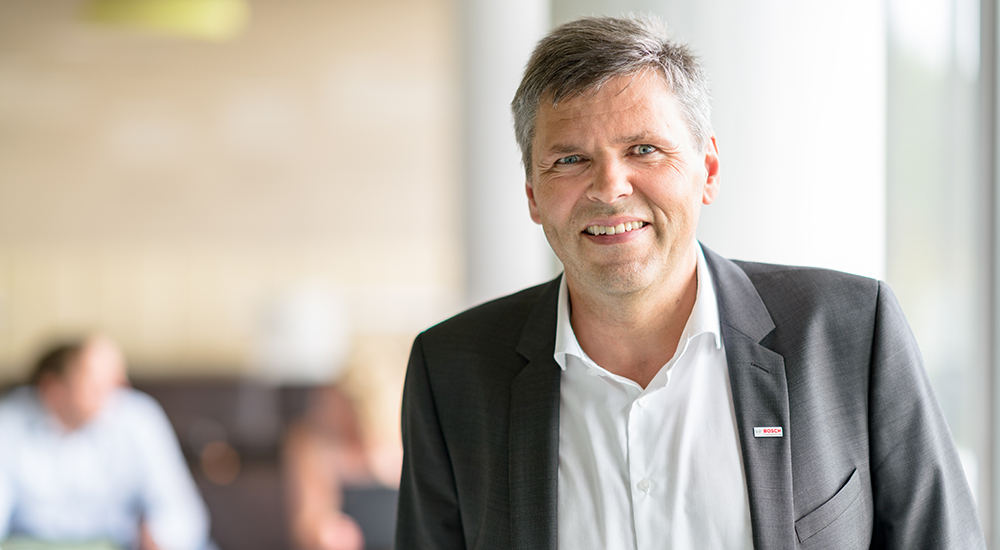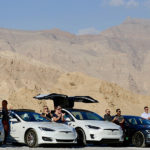Bosch demos AI solutions at CES, invests €3.7 billion annually in software development

Whether for automated driving, the smart home, or manufacturing, artificial intelligence, AI, has become an integral part of everyday life. Bosch uses AI and the internet of things, IoT, to make life easier for people and as safe as possible. The focus is on safe and robust AI for the manufacture of smart products, which Bosch showcased at this year’s CES. One of these products was the Virtual Visor: an AI-based digital vehicle sun visor that made its debut at the world’s largest trade fair for consumer electronics. The product has also won a CES Innovation Award, as has Bosch’s 3D display for the car.
As a pioneer in the development of life-saving driver safety systems such as ABS, ESP, and airbag control units, the company has already proved in the past that people benefit from reliable machines. AI can also make driver assistance systems even more efficient and intelligent: when Bosch’s AI camera for automated driving identifies partially concealed pedestrians, for example, the automatic emergency braking assistant can react even more reliably. Bosch is creating learning technology that is invented for life.
Innovations require investment. In addition to spending on software development, Bosch is investing worldwide in people and in competence centres. For example, the company is investing €100 million in the construction of a new AI campus in Tübingen, Germany. The move into the new research complex is planned for the end of 2022. It will then offer some 700 AI experts space for creative and productive exchange. These experts come from Bosch, external startups, and public research institutions.
Innovations require investment. In addition to spending on software development, Bosch is investing worldwide in people and in competence centres. For example, the company is investing €100 million in the construction of a new AI campus in Tübingen, Germany.
The new campus should strengthen exchange among experts in Cyber Valley. “Building trust together” will be a living reality there. Bosch is a founding member of Cyber Valley, which was established in 2016. This joint research venture brings together partners from industry, academia, and government to drive forward AI research and quickly transfer research findings into real-world industrial applications.
In addition, the Bosch Centre for Artificial Intelligence. BCAI, operates at seven locations worldwide, including two in the US: in Sunnyvale, California and Pittsburgh, Pennsylvania. The BCAI currently has a total of some 250 AI specialists working on more than 150 projects in the domains of mobility, manufacturing, smart homes, and agriculture.
Bosch has creative AI minds developing product innovations for mobility, the smart home, and Industry 4.0. Its AI world first for the automotive sector, which is celebrating its world premiere in Las Vegas, originated in the US, the Virtual Visor, which is a transparent digital sun visor. A transparent LCD display connected to the interior monitoring camera detects the position of the driver’s eyes. Using intelligent algorithms, the Virtual Visor analyses this information and darkens only the portion of the windshield through which the sun would dazzle the driver.
The Virtual Visor scored the highest in its category at the CES Best of Innovation Awards. Bosch’s new 3D display won its category as well. Using passive 3D technology, the display generates a realistic three-dimensional effect for images and alerts. This allows visual information to be grasped faster than when displayed on conventional screens, increasing road safety. Additional safety comes from Bosch’s new interior monitoring system for vehicles. It detects when the driver is drowsy or looks at a smartphone based on eyelid movements, direction of gaze, and head position, and alerts the driver to critical situations. It also monitors the vehicle interior to determine how many occupants are present and where and in what position they are sitting. This makes it possible to optimise the operation of safety systems such as the airbags in an emergency.
The Virtual Visor scored the highest in its category at the CES Best of Innovation Awards. Bosch’s new 3D display won its category as well. Using passive 3D technology, the display generates a realistic three-dimensional effect for images and alerts.
In 2019, Bosch sales of driver assistance systems rose by 12% to around €2 billion. They are paving the way for automated driving. In the future, when vehicles are in partially automated driving mode for sections of the journey such as on the freeway, the driver monitoring system will become an indispensable partner: In these situations, the camera will ensure that the driver can safely take the wheel again at any time. By 2022, the company will have spent around €4 billion on automated driving and will employ more than 5,000 engineers.
To round out its sensor portfolio in this domain, Bosch is now working on making lidar sensors production-ready as well. In addition to radar and cameras, lidar is the third essential sensor technology. The Bosch long-range lidar sensor can also detect non-metallic objects at a great distance, such as rocks on the road.
The company is aiming high with its SoundSee sensor system, which was sent into space at the end of 2019. Riding on NASA’s autonomous flying Astrobee robot, SoundSee will isolate unusual sounds on the ISS, analyse the audio using AI-driven analytics, and indicate when maintenance is necessary. Starting in early 2020, audio data captured by Soundsee will be delivered to a ground control facility configured to meet NASA specifications and built into the Bosch Research Centre in Pittsburgh, PA. The system, which is barely bigger than a lunchbox, was developed in the US together with Astrobotic as part of a NASA research collaboration.
A completely earthbound but no less innovative product is Vivascope, a smart pathology platform that helps in medical diagnosis. Vivascope magnifies specimens like blood and other bodily fluids, digitising the microscopic findings, and analysing them with the help of artificial intelligence-powered algorithms. It is capable of precisely and rapidly identifying cell anomalies and providing physicians with useful support in evaluation and diagnosis.
Bosch also showcased many non-AI innovations at CES. For example, its Light Drive smartglasses module is the world’s first sensor-based solution for making a normal pair of glasses smart. It is more than one-third thinner than other solutions on the market and weighs less than ten grams. The crystal-clear images projected into the wearer’s field of vision, which are clearly discernible even in direct sunlight, range from navigation information and text messages to calendar entries and operating instructions, depending on the information received from a smartphone or smartwatch.
At CES, Bosch used its IoT shuttle technology showpiece to present the solutions that the company offers automakers and mobility service providers for the electrification, automation, connectivity, and personalisation of ridesharing vehicles. Its portfolio goes beyond components to include seamlessly connected mobility services that give users flexibility in how they operate, manage, charge, and maintain their fleet vehicles, as well as making each journey safe. At the Bosch booth, visitors saw improved drive and sensor technologies for the connected and emissions-free mobility of the future.
Bosch is expanding the scope of its services for the residential internet of things. The highlight here is the open Home Connect platform, which was showcased at CES. Starting in mid-2020, the platform’s app will also offer control of lighting and shade, entertainment, and smart gardening equipment from different manufacturers. The number of partner companies, which is currently at 40, is set to more than double, making life at home even more convenient and efficient.
“The solutions we showcased at CES make it clear that Bosch aims to become an innovation leader in AI as well.”
Other Bosch AI highlights at the show included an application for predictive maintenance of the International Space Station, a system for monitoring vehicle interiors, and a smart platform for medical diagnostics. “The solutions we showcased at CES make it clear that Bosch aims to become an innovation leader in AI as well,” says Bosch Management Board Member Michael Bolle. “As of 2025, every Bosch product will either contain artificial intelligence or will have been developed or manufactured with the help of AI.” The global market volume for AI applications is expected to be around $120 billion over that same period, a twelvefold increase compared to 2018. Bosch wants to tap into that potential: the company already invests €3.7 billion each year in software development, currently employs more than 30,000 software engineers, and has 1,000 associates working on AI.
In addition, Bosch has established a comprehensive training programme. “We plan to make nearly 20,000 associates AI-savvy over the next two years,” Bolle explains. “We must invest not only in artificial intelligence, but in human intelligence as well.” The programme includes training formats at three different levels for managers, engineers, and AI developers and includes guidelines for using AI responsibly. To that end, Bosch has drawn up its own set of AI principles that address issues of AI security and ethics. With this in combination with its expertise, the company intends to build trust with customers and partners alike: “Anyone who has internalised technical and ethical principles knows how important data security and sovereignty are,” Bolle says. “In a way, trust is the product quality of the digital world.”
In the future, Bosch believes one core area of expertise will be the industrial application of artificial intelligence. “We want to harness the power of artificial intelligence not for the purpose of creating models of human behaviour, but instead to improve technology to benefit people,” Bolle says. “For this reason, industrial AI has to be safe, robust, and explainable.” According to Bosch, that means people should always remain in control, whether on the street, at home, or in manufacturing.





